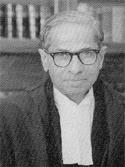
Meet Justice P.B. Gajendragadkar and his Notable Judicial decisions
Justice Pralhad Balacharya Gajendragadkar (1901–1981) was the 7th Chief Justice of India, serving from February 1, 1964, to March 15, 1966. Renowned for his scholarship in law and Sanskrit, he was a pivotal figure in shaping Indian constitutional and industrial jurisprudence. Educated at Satara High School, Karnatak College, Deccan College, and Law College, Poona, he joined the Bombay Bar in 1926 and became a judge of the Bombay High Court in 1945. He was elevated to the Supreme Court in 1957 and became Chief Justice in 1964.
Judicial Career and Philosophy
Justice Gajendragadkar authored 494 judgments and sat on 1,337 benches during his Supreme Court tenure, making him one of the most prolific judges in Indian history. He was known as a staunch defender of labour rights, a champion of constitutionalism, and an advocate for social reform. His judgments and public life were marked by a commitment to eradicating casteism, untouchability, and superstition, and he actively promoted national integration and unity.
He was also deeply involved in legal education and reform, serving as Chairman of the Committee for the Re-organisation of Legal Education at Delhi University, and after retirement, as Chairman of the Sixth Law Commission of India during the Emergency.
Landmark Judgments
1. Sajjan Singh v. State of Rajasthan (1964)
Justice Gajendragadkar, writing for the majority, upheld Parliament’s power to amend any part of the Constitution, including the Fundamental Rights chapter. This judgment was pivotal in the ongoing debate over the extent of Parliament’s amending power, though it was later reversed in Golak Nath v. State of Punjab (1967) and clarified in Kesavananda Bharati v. State of Kerala (1973), which established the ‘basic structure’ doctrine.
2. Labour and Industrial Law
Justice Gajendragadkar’s tenure is especially noted for his robust defense of labour rights. As Chairman of the Bank Award Commission (1955), his recommendations led to higher pay and stronger rights for bank employees, setting important precedents for industrial relations and workers’ welfare.
3. Constitutional and Social Reform
He presided over cases that clarified the scope of constitutional rights and the state’s power to regulate social practices. His judgments often balanced individual freedoms with the need for social justice, reflecting his commitment to progressive reform and national integration.
4. Judicial Integrity and Reform
Justice Gajendragadkar played a key role in maintaining the integrity of the judiciary. Notably, he intervened to secure the resignation of the Chief Justice of the Madras High Court, S. Ramachandra Iyer, following allegations of misconduct, thereby protecting the judiciary’s reputation.
Legacy
Justice Gajendragadkar’s impact extended beyond the courtroom. He was a prolific writer and speaker, contributing to legal scholarship and public discourse on law, liberty, and social justice. He was awarded the Padma Vibhushan in 1972 and held numerous positions in academic and social institutions, including Vice Chancellor of Bombay University and President of the Asiatic Society. His legacy endures in the fields of constitutional law, labour rights, and judicial ethics, making him a towering figure in the history of the Indian judiciary.












comments